RSU Student of the Year Roberts Kārkliņš: ‘Science is an integral part of medicine’
Writer: Keta Selecka, Public Relations Unit
Photo: Courtesy of RSU and Roberts Kārkliņš
‘I am ambitious and unafraid to pursue goals that often exceed what is considered possible,’ says Roberts Kārkliņš, the cheerful, energetic, and talented Student of the Year 2024 at Rīga Stradiņš University (RSU). Now in his sixth year of medical studies, Roberts has already demonstrated remarkable dedication and drive.
‘My own ambitions are secondary; my main desire in life is to help people. I always remember the Latin saying Salus aegroti suprema lex esto – the patient’s well-being is the highest law.’
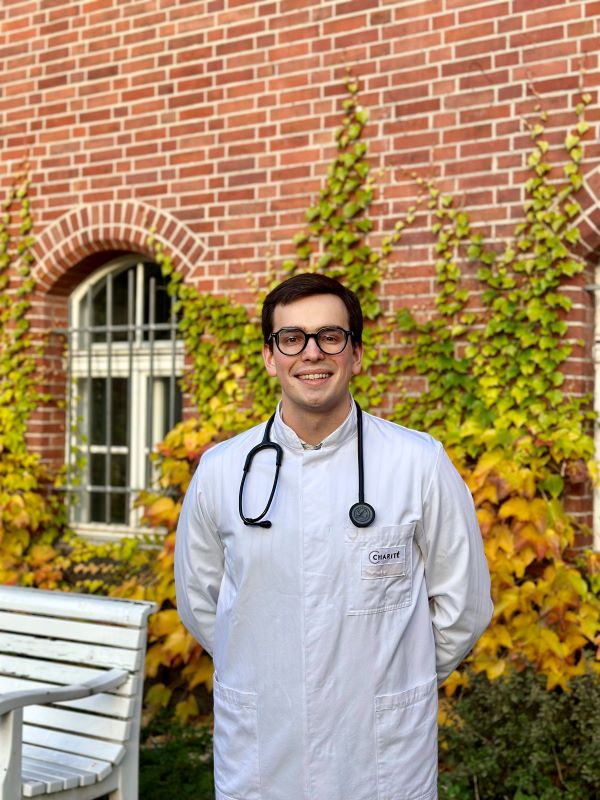 Roberts during his Erasmus+ exchange in Berlin in November 2023
Roberts during his Erasmus+ exchange in Berlin in November 2023
In addition to his studies, Roberts is deeply engaged in scientific research and learning from experienced colleagues, both in Latvia and internationally. He is currently focused on innovations in cell therapy related to cancer treatment.
The most important thing you want to tell the world about yourself...
I am a native of Vidzeme at heart. I come from the beautiful city of Valmiera, where you can see the twists and turns of Gauja River. I like to lie in the soft moss of a pine forest and carelessly watch the clouds pass by. This is my paradise – right here in Latvia! I care deeply about our country, and I am a great patriot. I have been actively involved in the Latvian Scouts and Guides Central Organisation for more than 10 years. In the past, I used to participate in the winter camp at Ložmetējkalns every year – it made me really appreciate what the brave riflemen did during the Latvian freedom battles. I believe that every Latvian should keep these memories in their heart.
Why did you choose to study medicine at RSU?
To be honest, I wanted to study social sciences because I am very talkative (laughs). I only started thinking seriously about studying medicine at the end of secondary school, despite having four doctors in my family and being given hints repeatedly that I should study medicine. My dad is a dentist, my grandmother was a dentist, my dad’s sister is a child psychiatrist, my grandfather was a surgeon and later a urologist.
In secondary school, I excelled in STEM subjects, but that wasn’t the main reason I chose medicine.
I asked myself: ‘What makes me happy?’ The answer came quickly – helping the people around me. That’s why I chose to study medicine.
I decided on RSU because, even in secondary school, I knew it was the best choice. I participated in the RSU Academy of Aspiring Physicians, which was organised at my school, Valmiera State Gymnasium.
You were the Head of the RSU Genetics Interest Group and remain an active member. What sparked your interest in research, and why did you choose genetics in particular?
Yes, I headed the research interest group in my 4th year of studies, and I still try to be involved in its discussions and practical sessions as much as possible. I am very inspired by the time spent with students who want to understand diseases in more depth and learn about the latest treatment methods.
I realised early on in my studies that I wanted to study why diseases occur and how they affect our bodies, which inevitably leads to looking for answers at the cellular and genetic level. This revelation quickly led me to the field of medicine that combines research and work with oncology patients in dire need of new treatment methods.
My interest was further strengthened by the countless patient stories and what I saw while volunteering in the haematology department at the Oncology Centre of Latvia, where I often witnessed a vicious cycle – endless rounds of chemotherapy, increasingly severe relapses and seemingly no light at the end of the tunnel.
Convinced that understanding the biology of malignant cells is the key to more effective treatment of oncology patients,
I joined the research group of Prof. Jekaterina Ērenpreisa at the Latvian Biomedical Research and Study Centre in early 2023.
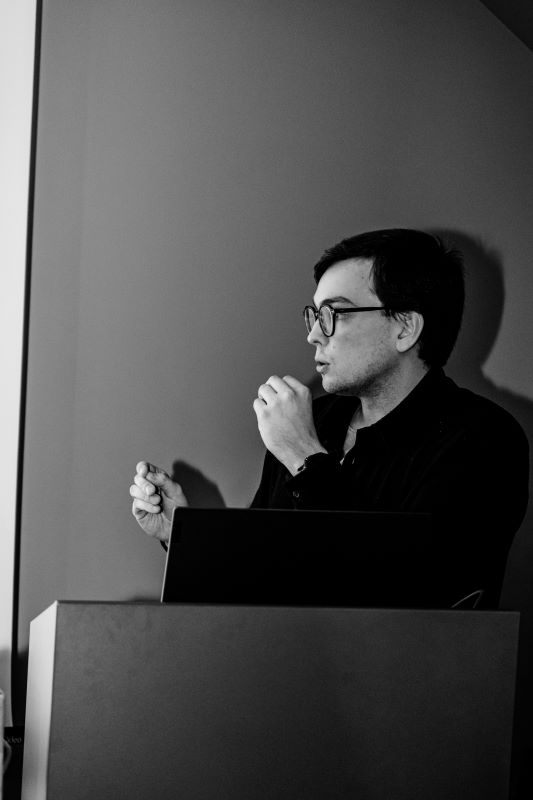 Giving a presentation about science to RSU students in June 2024
Giving a presentation about science to RSU students in June 2024
Here, under the professor’s guidance, I was convinced for the first time that malignant tumour cells are immeasurably intelligent and can adapt to different evolutionary challenges at an astonishing rate, functioning as a non-linear thermodynamic system that exists on the verge of chaos. It showed once again how complex the treatment of oncology patients really is. I would like to take this opportunity to thank the professor for the countless hours we spent talking about the meaning of science, ethics and the search for answers about the unknown.
In addition to volunteering at the Oncology Centre of Latvia in spring 2023, Prof. Sandra Lejniece offered me to participate in a research project on how B cells or B lymphocytes change in case of certain malignant blood tumours, such as chronic lymphocytic leukaemia and multiple myeloma. RSU leading researcher and Harvard Medical School postdoctoral researcher, Asst. Prof. Kristīne Oļeiņika took me under her wing and introduced me to the world of B-cell immunology.
Asst. Prof. Kristīne Oļeiņika provided me with my first insight into how to link basic research findings to the development of a specific disease and then how to implement them in real patient care.
We are currently studying the specificities of B-cell immunology, which are linked not only to haematological or malignant blood tumours, but also to autoimmune diseases
where the body’s immune system mistakenly attacks its own cells and tissues. In 2025, we will start a new project in collaboration with nephrologists at the Pauls Stradiņš Clinical University Hospital – to study how IgA nephropathy develops and what processes occur in the patients’ blood, kidneys and digestive tract at the molecular level. IgA nephropathy is a kidney disease caused by the deposition of proteins produced by the immune system (IgA antibodies) in the kidneys, leading to an inflammatory process and subsequent kidney damage.
Asst. Prof. Kristīne Oļeiņika has been my greatest scientific mentor and has not only inspired me to strive for ever higher goals, but also taught me to formulate research questions, combine different knowledge and information to generate new ideas, and plan experiments that can answer these questions.
I believe that science is an essential part of modern medicine and the primary driver of improved patient care. It’s a two-way street: clinical experience at the patient’s bedside raises new questions, prompting a return to the laboratory,
while laboratory findings fuel clinical trials, which in turn benefit the patient. This continuous cycle is at the heart of medical advancement.
In the autumn semester of 2023, you studied for six months at the Charité University Hospital of Berlin through the Erasmus+ exchange programme and were on a placement at the Berlin Institute of Health alongside your studies. What is the most vivid memory from that time?
The Charité University Hospital of Berlin is one of the most outstanding medical, scientific and educational centres in the European Union. The Faculty of Medicine at this hospital is jointly run by the Humboldt University of Berlin and the Free University of Berlin. As I wanted to do scientific research at a world-class institute in Berlin alongside my studies, after about 50 emails and three rounds of interviews I managed to get a scientific assistant position at the Berlin Institute of Health, one of the largest science centres in Germany, the main task of which is to make the knowledge gained in research practically applicable in clinical work.
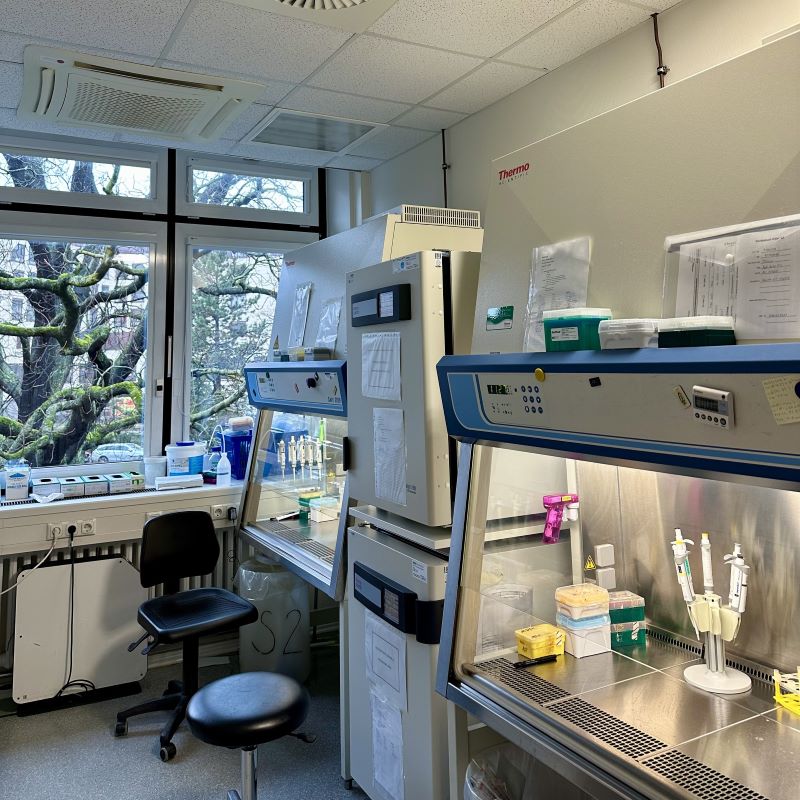 A view from the daily research life at the Berlin Institute of Health in January 2024
A view from the daily research life at the Berlin Institute of Health in January 2024
This experience made me realise for the first time how closely research is linked to practical work at the patient’s bedside.
At the Berlin Institute of Health, I worked in the research group of Michael Schmück-Henneresse, where we developed an innovative approach to cancer treatment using specially modified immune cells – CAR-T therapy. This involves the genetic engineering of primary T lymphocytes, or T cells. These cells are able to target malignant tumour cells in the patient’s body.
This treatment method is one of the biggest medical breakthroughs of the last 10 years and my main research interest.
You’ve just come back from another research placement...
Yes, I wanted to get some extra scientific experience between my 5th and 6th year of studies, so I did a placement for four months to continue my research work on new CAR-T cell products that I started in Berlin. Our aim is to destroy malignant cells more and more precisely and efficiently, while leaving healthy cells almost untouched. This is one of the biggest problems with chemotherapy, because it destroys not only the malignant cells, but also other cell types that divide a lot.
CAR-T cell therapy is a glimmer of hope for patients who experience multiple recurrences of their malignancy and find themselves in a situation where no new treatment options are available. In the pre-clinical phase, we tested how well the new genetically modified T cells can kill tumour cells. We did this both in the laboratory, using tumour cell lines and patient-derived organoids, and in animal models to assess the efficacy and mechanisms of action of these cells in a full-fledged biological system.
It is deeply fascinating to see how scientific breakthroughs are moving step by step towards clinical trials with patients.
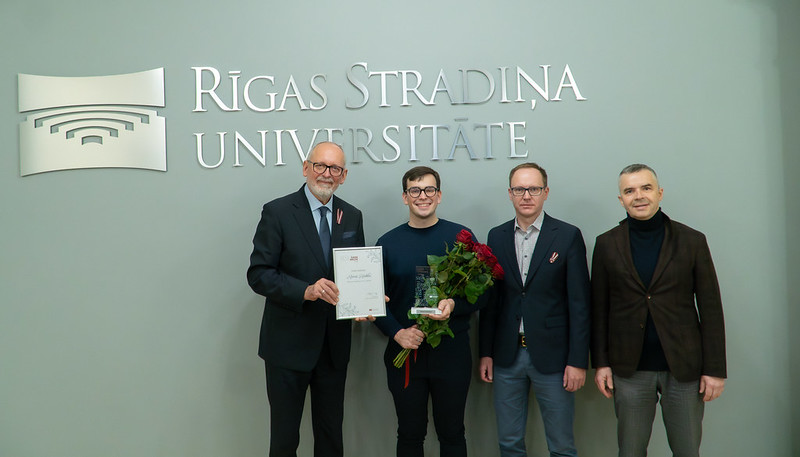 As Roberts did not attend the Academic Ball in September, where the RSU Annual Awards are presented, due to his placement, the university management presented him with the award on 22 November. From the left: RSU Rector Aigars Pētersons, Roberts Kārkliņš, Vice-Rector for Health Studies Andris Skride and Vice-Rector for Academic Affairs Dins Šmits
As Roberts did not attend the Academic Ball in September, where the RSU Annual Awards are presented, due to his placement, the university management presented him with the award on 22 November. From the left: RSU Rector Aigars Pētersons, Roberts Kārkliņš, Vice-Rector for Health Studies Andris Skride and Vice-Rector for Academic Affairs Dins Šmits
What is your main goal in life?
The main goal has always been, is, and will continue to be helping people. I believe that medicine remains one of the few professions that truly feels like a calling, which is why I want to dedicate my life not only to treating patients in acute and chronic situations, but also to supporting their long-term healing. The patient’s psycho-emotional balance is crucial for their recovery.
Are you planning to pursue your career in Latvia?
I am determined to pursue a career as a medical scientist, which encompasses both clinical and research work. Unfortunately, in the field of cell and gene therapy—an area that greatly interests me—there is limited work being done in Latvia, particularly in translating scientific discoveries into clinical trials. So I will take my further career steps outside Latvia by enrolling in a doctoral study programme to maximise my knowledge in fundamental research, or research that helps us understand how the human body, diseases and cellular processes work and interact at the most detailed level. I want to apply for a residency programme in the USA, which offers the opportunity to combine clinical work with dedicated time for research (research track residency). Unfortunately, there is no such programme in Latvia at the moment, so the most capable medical residents do not have enough time to devote solely to science.
My dream would be to bring this knowledge back to Latvia in the future and to establish new branches of science and strengthen the existing ones.
In Latvia, I think it is very important to promote the education of prospective doctors and scientists in the world’s best clinics and universities, which often takes several years. This will encourage the young and brightest minds to return to Latvia.
What are your hobbies? What do you enjoy doing in your free time?
There is no place where I feel as at home as I do in nature. I love going on long hikes—being active is the best way for me to organise my thoughts. I also enjoy orienteering at an amateur level, which allows me to explore every corner of Latvia’s natural landscapes and cities.
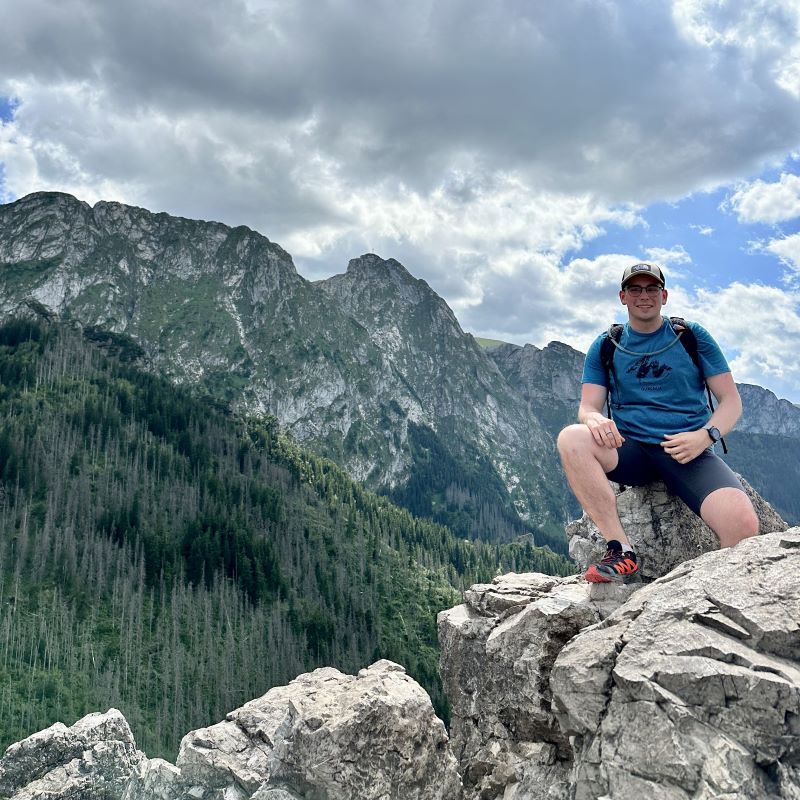 Active holidays in the Polish Tatra Mountains in July 2023
Active holidays in the Polish Tatra Mountains in July 2023
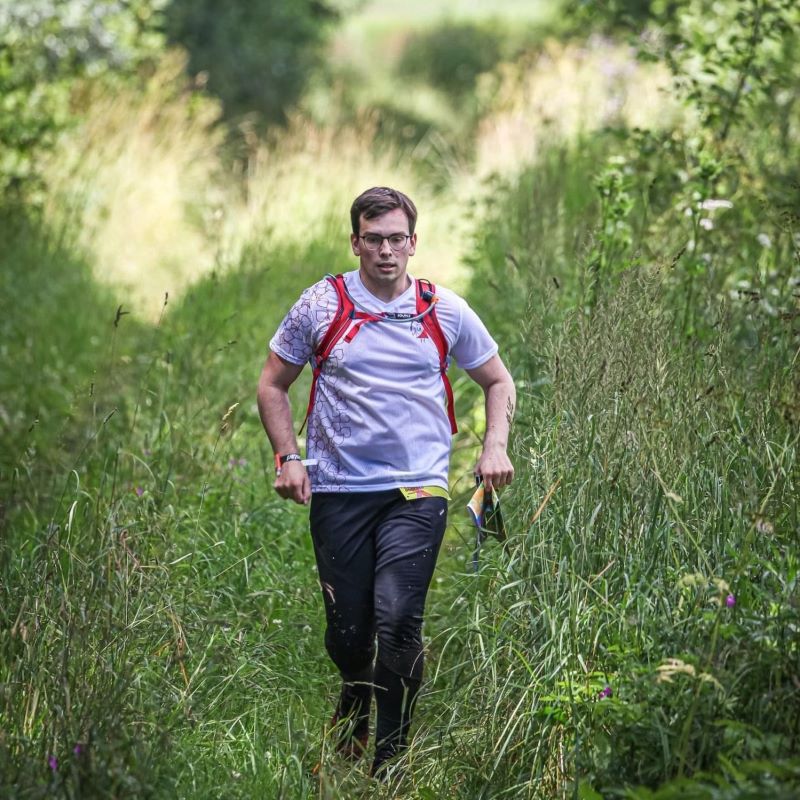 A moment from the orienteering competition in Valmiera in July 2022
A moment from the orienteering competition in Valmiera in July 2022
In my free time, I enjoy getting creative in the kitchen, baking various delicacies. A special thanks to my mum for the best cheese buns recipe! Although I have less time for it now, I love reading books. In particular, I’d like to mention J. R. R. Tolkien’s The Lord of the Rings, Tove Jansson’s books about the beautifully bittersweet world of the Moomin trolls, and A. A. Milne’s Winnie-the-Pooh and His Friends. I seem to find myself quoting Winnie-the-Pooh every day—it makes it easier to view life with a lighter perspective, especially when we all sometimes find ourselves in a “tight place.”
Roberts' mother's cheese bun recipe
‘I am passing on this recipe with my mother's blessing,’ says Roberts.
Ingredients
- 500 g wheat flour
- 200 g butter
- 30 g compressed yeast or 10 g dry yeast
- 240 ml milk
- 1 egg + 1 egg for topping
- 1 tablespoon sugar
- 1 teaspoon salt
For the filling: softened butter and 300-500 g of grated cheese
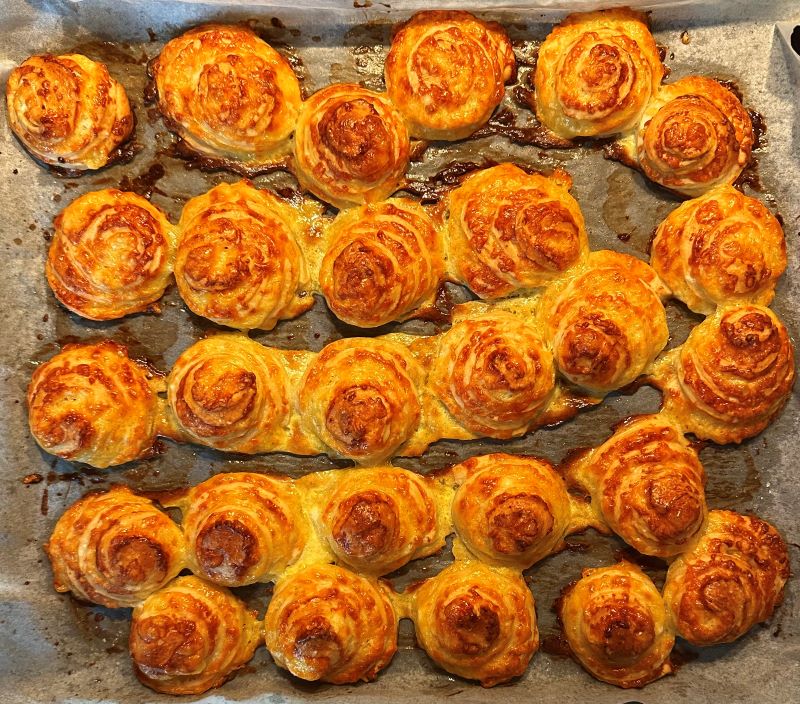
- Instructions
- Melt the butter in a saucepan, add the milk and heat to about 37°.
- Add the yeast to the heated mixture, add the sugar and let the yeast “come to life” for about 7-10 minutes.
- Add the egg, flour and salt. Knead the dough actively and cover with a lightly dampened clean kitchen towel and leave to rise for about an hour.
- While the dough is rising, grate the cheese on a coarse grater.
- When the dough has risen (approximately doubled in size), flatten it and place it on a floured surface and roll it out as thin as possible.
- Grease the rolled dough with softened butter and top with grated cheese. Roll the dough into a long roll and cut into larger or smaller pieces as you wish.
- Place the buns on a baking tray lined with baking paper and open them a little like flowers. Let the buns rise for about 15 minutes.
- In the meantime, preheat the oven to 180°.
- Brush the risen buns with beaten egg and sprinkle with a pinch of salt. Bake for about 20-25 minutes until the buns are golden brown.
- Enjoy and share them with everyone around you!




